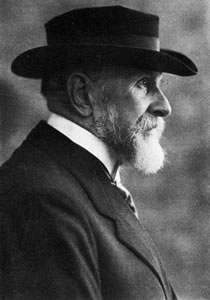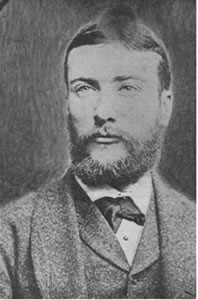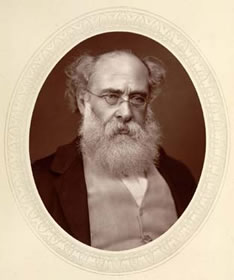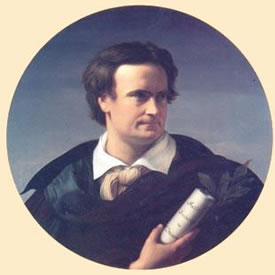De Zwitser dichter, schrijver, essayist en criticus Carl Friedrich Georg Spitteler (eig. Carl Felix Tandem) werd geboren op 24 april 1845 in Liestal bij Basel. Zie ook mijn blog van 24 april 2007 en ook mijn blog van 24 april 2008 en ook mijn blog van 24 april 2009en ook mijn blog van 24 april 2010.
Die Blütenfee
Maien auf den Bäumen, Sträußchen in dem Hag.
Nach der Schmiede reitet Janko früh am Tag.
Blütenschneegestöber segnet seine Fahrt,
Lilien trägt des Rößleins Mähne, Schweif und Bart,
Lacht der muntre Knabe: »Sag’ mir, Rößlein traut:
Bist bekränzt zur Hochzeit, doch wo bleibt die Braut?«
Horch, ein Pferdchen trippelt hinter ihm geschwind,
auf dem Pferdchen schaukelt ein holdselig Kind.
Solche kleine Fante nimmt man auf den Schoß,
auf die Schulter wirft er’s spielend: Ei! wie groß!
Zappelnd schreit die Kleine: »Böser Bube du!
Weh! ich hab verloren meinen Lilienschuh.«
Rückwärts sprengt er suchend ein geraumes Stück.
Wie er mit dem Schuhe eilends kam zurück,
an des Kindes Stelle saß die schönste Maid.
Da geschah dem Jungen süßes Herzeleid.
Flüsterte die Schöne: »Liebster Janko mein,
hab’ ein kostbar Ringlein, strahlt wie Sonnenschein.
Bin dir hold gewogen, schenk’ es dir zum Pfand.
Weh! ich hab’s vergessen, badend an dem Strand.«
Wie er mit dem Wasser kam zum selben Ort,
war zu Staub und Asche Weib und Pferd verdorrt.

Carl Spitteler (24 april 1845 – 29 december 1924)
De Australische schrijver Marcus Clarke werd geboren op 24 april 1846 in Londen. Zie ook mijn blog van 24 april 2009en ook mijn blog van 24 april 2010.
Uit: For the Term of His Natural Life
„At a little distance from the mainland is a rock, over the rude side of which the waves dash in rough weather. On the evening of the 3rd December, 1833, as the sun was sinking behind the tree-tops on the left side of the harbour, the figure of a man appeared on the top of this rock. He was clad
in the coarse garb of a convict, and wore round his ankles two iron rings, connected by a short and heavy chain. To the middle of this chain a leathern strap was attached, which, splitting in the form of a T, buckled round his waist, and pulled the chain high enough to prevent him from stumbling over it as he walked. His head was bare, and his coarse, blue-striped shirt, open at the throat, displayed an embrowned and muscular neck. Emerging from out a sort of cell, or den, contrived by nature or art in the side of the cliff, he threw on a scanty fire, which burned between two hollowed rocks, a small log of pine wood, and then returning to his cave, and bringing from it an iron pot, which contained water, he scooped with his toil-hardened hands a resting-place for it in the ashes, and placed it on the embers.
It was evident that the cave was at once his storehouse and larder, and that the two hollowed rocks formed his kitchen.“

Marcus Clarke (24 april 1846 – 2 augustus 1881)
De Engelse schrijver Anthony Trollope werd geboren in Londen op 24 april 1815. Zie ook mijn blog van 24 april 2009en ook mijn blog van 24 april 2010.
Uit: The Genius of Nathaniel Hawthorne
“The predominating quality of Puritan life was hard, good sense, a good sense which could value the realities of life while it rejected the frivolities, a good sense to which buttered cakes, water-tight boots, and a pretty wife, or a kind husband could endear themselves. Hawthorne is severe, but his severity is never of a nature to form laws for life. His is a mixture of romance and austerity, quite as far removed from the realities of Puritanism as it is from the sentimentalism of poetry. He creates a melancholy which amounts almost to remorse in the minds of his readers. There falls upon them a conviction of some unutterable woe which is not altogether dispelled till other books and other incidents have had their effects. The woe is of course fictitious, and therefore endurable, and therefore alluring. And woe itself has its charm. It is a fact that the really miserable will pity the comfortable insignificance of those who are not unhappy, and that they are apt even to boast of their own sufferings. There is a sublimity in mental and even in corporal torment which will sometimes make the position of Lucifer almost enviable. Allis not lost with him! Prometheus chained, with the bird at his liver, had wherewithal to console himself in the magnificence of his thoughts“.

Anthony Trollope (24 april 1815 – 6 december 1882)
De Duitse dichter en schrijver Carl Leberecht Immermann werd geboren op 24 april 1796 in Magdeburg. Zie ook mijn blog van 24 april 2009en ook mijn blog van 24 april 2010.
Allgemeine Vergebung
Wenn sonst mich wer gekränket hat,
Hab’ ichs behalten im Gedächtniß;
Allein, deß bin ich wahrlich satt,
Zorn ist ein allzuherb Vermächtniß:
Drum, wie sie sich an mir vermessen,
Es sey vergeben und vergessen!
Viel Ehrenmänner dünkelhaft
Sich legten breit auf das Dociren,
Und wollten meine junge Kraft
Nach ihren Grillen stylisiren;
Wie die Pedanten sich vermessen,
Es sey vergeben und vergessen!
Und Freunde hatt’ ich lobesan,
Bei meiner Jugend heitrem Schmause;
Doch als die große Noth begann, .
So waren alle nicht zu Hause;
Wie sich die Freund’ an mir vermessen,
Es sey vergeben und versessen.
Die Allerschönst’ hat mich geliebt,
Mich ln Verzweiflung fast zu bringen;
Was es dabei für Sachen giebt,
Davon ist besser nicht zu singen;
Wie sich die Schönst’ an mir vermessen,
Es sey vergeben und vergessen!
Du endlich, lieber Gott, gehörst
Zu denen auch, die mich verletzet;
Hast, ohn’ einmal zu fragen erst,
Mich auf den Sündenball gesetzet;
Doch, wie du dich an mir vermessen,
Es sey vergeben und vergessen!
Sey Friede! Rein das ganze Feld!
Doch dafür bittet mein Gemüthe;
Gott, Schöne, Freunde, große Welt,
Erstattet mir die herz’ge Güte:
Wie ich mich hab’ an euch vermessen,
Sey auch vergeben und vergessen!

Carl Immermann (24 april 1796 – 25 augustus 1840)
